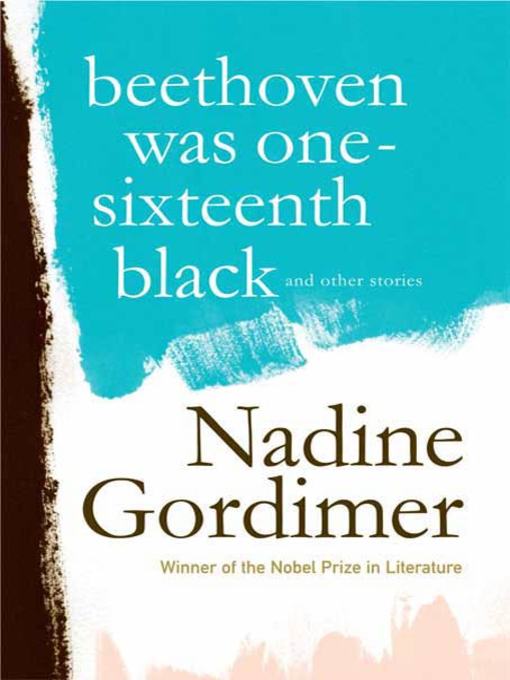"You're not responsible for your ancestry, are you . . . But if that's so, why have marched under banned slogans, got yourself beaten up by the police, arrested a couple of times; plastered walls with subversive posters . . . The past is valid only in relation to whether the present recognizes it."
In this collection of new stories, Beethoven Was One-Sixteenth Black, Nadine Gordimer crosses the frontiers of politics, memory, sexuality, and love with the fearless insight that is the hallmark of her writing.
In the title story a middle-aged academic who had been an anti-apartheid activist embarks on an unadmitted pursuit of the possibilities for his own racial identity in his great-grandfather's fortune-hunting interlude of living rough on diamond diggings in South Africa, his young wife far away in London. "Dreaming of the Dead" conjures up a lunch in a New York Chinese restaurant where Susan Sontag and Edward Said return in surprising new avatars as guests in the dream of a loving friend. The historian in "History" is a parrot who confronts people with the scandalizing voice reproduction of quarrels and clandestine love-talk on which it has eavesdropped. "Alternative Endings" considers the way writers make arbitrary choices in how to end stories—and offers three, each relating the same situation, but with a different resolution, arrived at by the three senses: sight, sound, and smell.
-
Creators
-
Publisher
-
Release date
November 27, 2007 -
Formats
-
Kindle Book
-
OverDrive Read
- ISBN: 9781429967600
-
EPUB ebook
- ISBN: 9781429967600
- File size: 217 KB
-
-
Languages
- English
-
Reviews
-
Publisher's Weekly
Starred review from September 10, 2007
Thirteen stories from South African Nobel Prize–winner Gordimer offer a staccato demonstration of how people’s origins, inheritances and histories—and the loss of them—are inescapable. The title story centers on the white, twice-divorced academic descendant of a London diamond prospector who visits his forebear’s mine in Kimberly, South Africa, and wonders about who in the township, black and white, he may be related to. The narrator of “Dreaming of the Dead” is haunted by famous former companions (the late intellectuals Edward Said and Susan Sontag), while the grieving widow of “Allesverloren
” (or “All Is Lost”) seeks out her husband’s former lover to unearth a message from him. The daughter of “A Beneficiary,” meanwhile, finds an unsettling letter among the effects of her late mother, an actress. Cultural inheritance shadows the marriage of a Hungarian couple that emigrates to South Africa in “Alternate Endings: Second Sense,” and also the son of “A Frivolous Woman,” who resents his flamboyant German-Jewish émigré mother’s easy adaptability. Again and again, Gordimer puts big, sweeping disasters (the Holocaust, apartheid) in the pasts of flawed, ill-equipped characters and shows how their choices have been little more than wing beats against history. The results are terrifying, sometimes acidly funny and often beautiful. -
Library Journal
Starred review from October 1, 2007
In these tantalizing and provocative short stories, Nobel prize-winning South African writer Gordimer ("The Pickup") experiments with various unusual points of view. The narrator in "Tape Measure," for example, is a tapeworm. "Dreaming of the Dead," meanwhile, is a dream about a fascinating conversation at a Chinese restaurant among the sleeper and the late Susan Sontag and Edward Said. In "Gregor," a narrator who admits to reading Kafka's diaries night after night sees a roach on the display screen of her electronic typewriter, and, with the help of a neighbor, dismantles the screen and destroys the roach. Gordimer raises the question: "What happens if something from fiction is not interiorised, but materializes? Takes in independent existence?" She can be quite playful, e.g., in "Historian," a parrot continually comments on the patrons of the restaurant where his cage hangs. The last three stories, though they all deal with the issue of adultery, arrive through the senses of sight, sound, and smell at three different outcomes. With Gordimer's exquisite use of language, keen insight into social relationships, and elegant writing style in full form, this work is recommended for all libraries. [See Prepub Alert, "LJ" 8/07.]Lisa Rohrbaugh, East Palestine Memorial P.L., OHCopyright 2007 Library Journal, LLC Used with permission.
-
Loading
Why is availability limited?
×Availability can change throughout the month based on the library's budget. You can still place a hold on the title, and your hold will be automatically filled as soon as the title is available again.
The Kindle Book format for this title is not supported on:
×Read-along ebook
×The OverDrive Read format of this ebook has professional narration that plays while you read in your browser. Learn more here.


